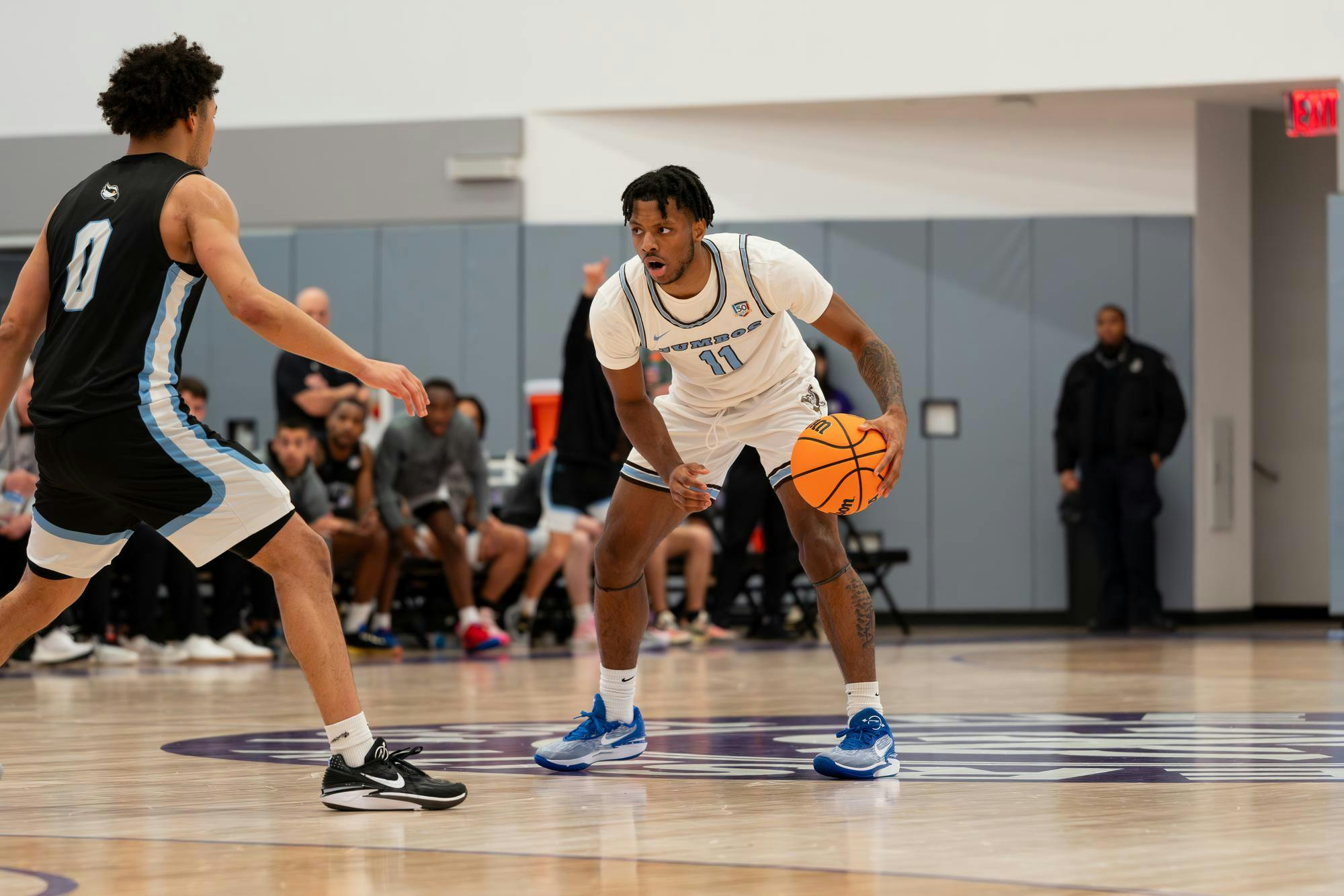The men’s basketball team lost to the Trinity Bantams this past weekend in the Sweet 16, ending its incredible run in the NCAA Tournament. The Jumbos faced a tough obstacle in this year’s NESCAC champions, the Bantams. Tufts finishes its season 21–8 during the program’s fifth trip to the Sweet 16. After graduating four seniors who made big contributions on the court, the program looked to adjust, and went on to exceed expectations in its tremendous success. Sophomore forward Scott Gyimesi, one of three sophomores in a new starting role and the team’s season-high scorer, attributed this season’s smooth adjustment to senior leadership.
“From the outside it looked like this year would be a transition year for us, or a year of growth [with some] struggles because we’re a younger lineup,” Gyimesi said. “We lost five seniors, four of which were major contributors to our team on the court last year. … There was just a lot of mystery going into this year, and [senior guard Jay Dieterle] and [senior guard Casey McClaren] … really just took that [leadership] role and ran with it.”
Tufts lost to Trinity twice before, once in the regular season, 82–66, and once again in the NESCAC tournament semifinal game, 80–68. The Bantams not only won the NESCAC but also added on accolades in winning this year’s NESCAC Defensive Player of the Year, earning two all-NESCAC first team slots and the award for NESCAC Coaching Staff of the Year. After the Bantams took down Tufts, they went on to win the Elite 8 matchup against Calvin University, now at an impressive 30–1 record. Tufts players described Trinity and technical factors that contribute to their success.
“There [are] a couple of systematic things that they do that’s tough to guard,” sophomore center Joshua Bernstein said. “[Trinity] is a team that forces us to cross-match against them. So their big guy is not guarded by our big guy and vice versa. And they’re a very high 3-point shooting team. So in transition when you’re trying to find your guys, they aren’t next to you. When you’re on offense, you’re trying to get back to defense and you’re all mismatched, they can really take advantage of that.”
Gyimesi expanded on the team’s depth off the bench as an additional advantage.
“I think their second unit is incredibly strong as well,” Gyimesi said. “In their Elite 8 game, I think their second unit was plus 17 when they were on the floor, and they only won by 7. Their top guys didn't really have a great night, but they were still able to advance to the Final Four.”
Additionally, playing at home, the Bantams benefitted from the home-court energy and fan support, fueling momentum and allowing for offensive runs.
“They had a huge crowd, obviously, being a Sweet 16 game,” Gyimesi said. “That was just a huge factor in and of itself. Any play that went even remotely in their way, the energy just shifted to them. As an away team or visiting team, like we were, you have to sort of balance that.”
Unlike the previous two matchups, the Jumbos defended the basket and outside key better, allowing for fewer total points scored and forcing more difficult 3-point shots. Entering the half, Tufts held Trinity to just 25 points. The Jumbos tallied 21 of their own, thanks to a late 3-point make by junior guard Khai Champion to cut the lead to four. Heading into the second half, the Jumbos capitalized on their momentum, coming out strong and trading leads and tied scores with the Bantams for the first 10 minutes. The Bantams played to their strengths, however, and got hot beyond the arc, steadily piling on a lead. After his momentum-shifting 3-pointer in the first half, Champion acknowledged a similar play by the Bantams in the second half.
“They went on a little run in the second half and we had a good possession of defense," Champion said. “Basically, played good defense for most of the shot clock, and at the end of the clock — I forget who it was on their team — one of their bench guys had a three off the backboard that went in, and then the crowd just went absolutely ballistic. And that continued their run.”
Despite not getting the desired outcome, the Jumbos finish with an impressive NCAA run. Champion described the late-season practices and the teamwide work ethic.
“This year, our run in the NCAAs were some of the best, most focused, most intense practices that we’ve had,” Champion said. “I think taking that focus and intensity and just being able to experience that was really valuable for me because it showed the potential we have to really lock into a game plan, and really work hard and practice and challenge each other to face really hard opponents.”
Bernstein provided another lesson learned from the season and expanded on the valuable experience for the young roster moving forward.
“I was watching the Trinity postgame press conference, and they were talking a little bit about how their shift from last year to this year is discipline,” Bernstein said. “That’s exactly where we’re at right now. We’re making that shift to just a completely different team when it comes to our mental state. … So I think more than anything, as opposed to just getting in the gym and getting shots up, that’s all going to come, it’s more of a mentality shift where we just have to understand truly what it takes. We got a little bit of a taste this year, and so we now know what it looks like. But, obviously, we’re always gonna want more.”






